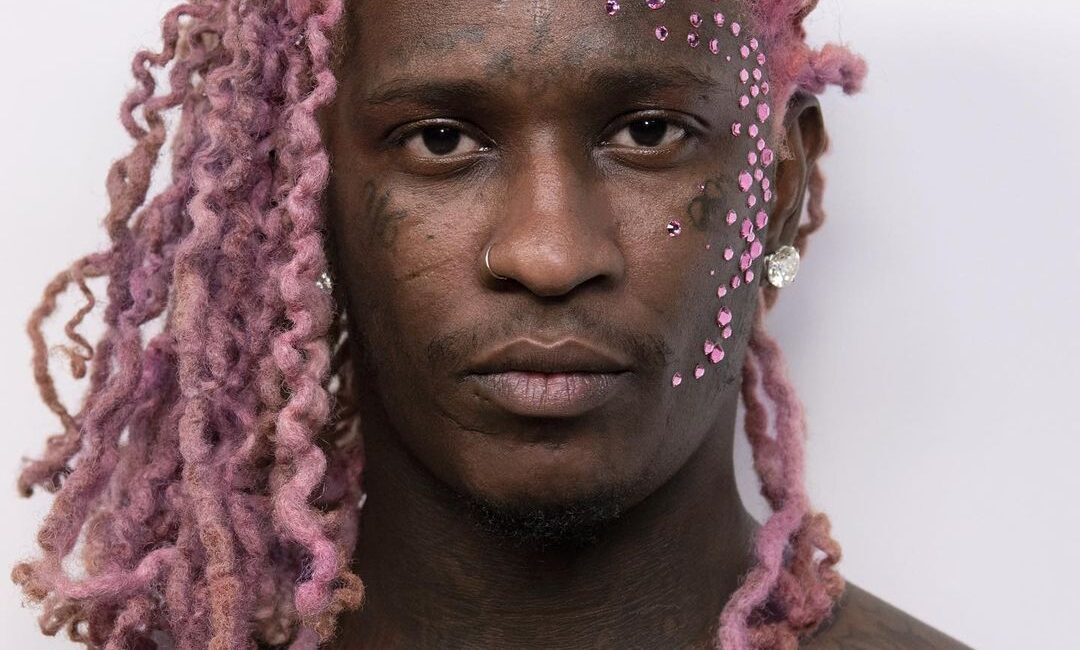Photo: Young Thug (from his Facebook page) | By Ben Beaumont-Thomas, The Guardian | A judge has said lyrics will be admissible as evidence in the trial of star US rapper Young Thug, a controversial practice that has been decried by free speech groups and other stars such as Jay-Z and Coldplay.
Known for his distinctive vocal timbre, Young Thug, real name Jeffery Williams, is one of the most successful and critically acclaimed rappers in the US, whose albums So Much Fun and Punk both topped the charts there. He will shortly go on trial in his home city of Atlanta for racketeering, accused of running what prosecutors call “a criminal street gang” called YSL (Young Slime Life, also Young Stoner Life), members of which have been charged with murder, carjackings and other alleged crimes. Williams’s legal team maintain YSL is a record label and music collective, with lawyer Brian Steel saying the rapper has “committed no violation of law whatsoever”.
Twenty-eight people were initially charged, including another chart-topping rapper, Gunna (real name Sergio Kitchens), who took a plea deal that allowed him to maintain his innocence. Other defendants took plea deals, were not arrested, or saw their cases separated from the racketeering case, leaving Williams and five others still to face trial.
The judge for the case, Ural Glanville, has now permitted prosecutors to introduce some Young Thug song lyrics as evidence, saying: “I’m going to conditionally admit particularised lyrics.”
Addressing Williams’s legal team during the hearing, Glanville argued prosecutors were “not prosecuting your clients because of the songs they wrote. They’re using the songs to prove other things your clients may have been involved in … I don’t think it’s an attack on free speech.”
> > > > > > > > >
Read the whole article including Jay-Z’s proposed changes to the law:
https://www.theguardian.com/music/2023/nov/10/lyrics-introduced-evidence-in-trial-of-rapper-young-thug
# # # # #
Related article:
Behind Bars: How Rap Lyrics are Being Used to Convict Black British Men
By Will Pritchard, The Guardian
On February 6, 2020, around 11.15 am, a 16-year-old boy stepped out of Brighton’s Regent Hotel and walked towards the terraced green of Regency Square. He had with him a handful of small, pebble-sized packages, some bound in blue plastic, the others in white. The different colors let him know which contained heroin, and which cocaine. Plain clothes police officers watching the boy soon discovered another 115 similar wraps in the hotel room he had been staying in.
Just over a year later, at the crown court in Lewes, a jury convicted the boy, who had been sent to Brighton by a north London gang known as the Mali Boys, of two counts of being concerned in the supply of Class A drugs.
James (not his real name) had been placed into care early in his teens, the court had heard, and subjected to abuse in the years before that. He’d been arrested in the past, and had moved and sold drugs for other gangs from north London, venturing as far as Norfolk with their packages. James is also autistic. His lawyers suggested this would have made him more susceptible to being drawn into criminality by these gangs.
> > > > > > > >
https://www.theguardian.com/music/2023/jun/21/behind-bars-how-rap-lyrics-are-being-used-to-convict-black-british-men
[Thanks to Alex Teitz for contributing this article! http://www.femmusic.com]
Photo: Young Thug – Rolling Stone cover | http://www.facebook.com/youngthugmusic/

